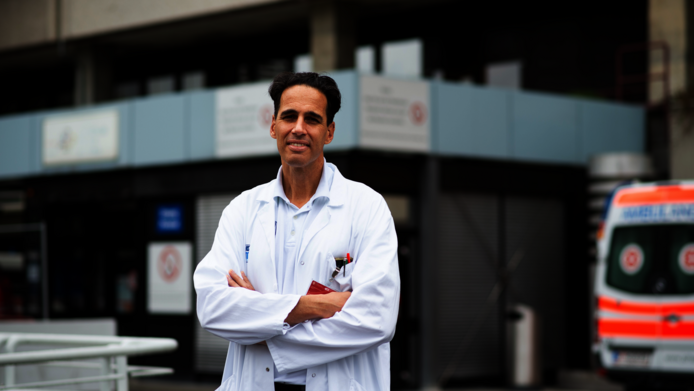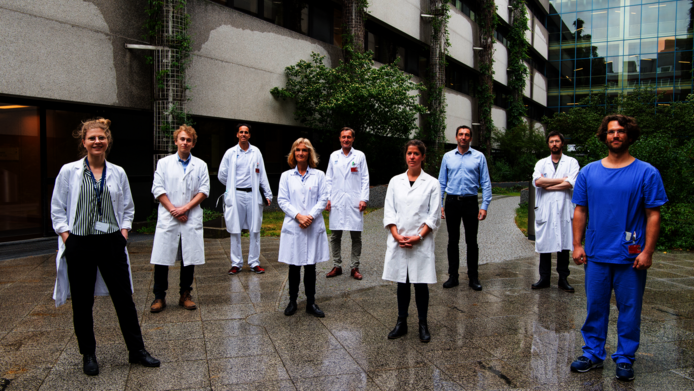What Corona has to do with high blood pressure

How did the project come about? When did the idea first come to you?
Manfred Hecking: In the beginning I – like many others – ignored the coronavirus. Shortly before the lockdown, I met Marko Poglitsch, a specialist in bioanalysis, to discuss a joint research project. Marko and I have known each other for over 15 years. His company specializes in using mass spectrometry to analyze the renin-angiotensin system, or “RAS” for short, which regulates blood pressure in the human body. They are developing a personalized approach to antihypertensive therapy designed for use in clinical practice in the near future. Marko’s research has resulted in a unique profile of the central blood pressure hormones, the so-called RAS fingerprint. I asked Marko if there were any international RAS fingerprint studies in connection with corona, and there were none at the time. I found that hard to believe and immediately started writing a proposal and getting colleagues together for such a project.
What does RAS have to do with Covid-19?
Hecking: First of all, SARS-CoV-2 uses a specific RAS enzyme, the so-called angiotensin-converting enzyme 2, as its entry receptor into human cells, including lung cells. Josef Penninger has done ground-breaking work in this respect. SARS-CoV-2 attacks and destroys the cells that produce this enzyme, which upsets the RAS balance. In this project we would therefore like to explore the influence of SARS-CoV-2 on the RAS in detail.
Furthermore, we are also interested in RAS blockers, i.e. drugs for the treatment of hypertension and cardiac insufficiency, which have a major influence on the RAS: when the corona pandemic broke out, small individual animal studies immediately led to discussions as to whether patients taking such RAS blockers should stop taking them in order to reduce the SARS-CoV-2 infection risk. It was also suspected that the reason why the north of Italy was so severely affected might be the more frequent administration of RAS blockers there. This hypothesis triggered an outcry from medical associations. At the international level, cardiologists warned against discontinuing these important drugs merely on the basis of a few animal studies.
What is your opinion?
Hecking: There might even be a positive influence on the disease, particularly by RAS blockers from the sartan class. There is a great need for studies focusing on this possible connection. We have planned such a study and the FWF is now financing it as part of its urgent funding for research into pandemics.
What exactly does this study look like?
Hecking: Our study is part of a larger study at the Medical University of Vienna called ACOVACT, which stands for Austrian Coronavirus Adaptive Clinical Trial. In ACOVACT, various antiviral therapies are being tried out in the so-called main study, and these are also being tested in a similar form all over the world. The active substances concerned include Lopinavir and Ritonavir.
Sub-studies are examining various things, including an anticoagulation therapy, or the drug Clazakizumab for particularly severely affected patients. So the patients receiving antiviral therapy include individuals with high blood pressure and/or those who already receive RAS blocker therapy. The RAS blocker is discontinued or administered under medical control, and all individuals are RAS fingerprinted before discontinuation and at certain intervals afterwards. The same applies to all other people in the ACOVACT study.
How large is this study?
Hecking: When we submitted the application, nobody knew how the infection figures would develop. We estimated that we would be able to examine 200 patients by the end of the year. With the current favourable infection rates this might not be practicable. Meanwhile there are international consortia that are investigating similar issues in the context of clinical trials. We assume that we will very soon be able to provide first results with the RAS fingerprinting. After a preliminary analysis of about 40 individuals we should already be in a position to make concrete statements on the evolution over time of RAS changes during a Covid-19 infection.
What is your current timetable?
Hecking: It is hard to predict how case numbers will develop in the future. We have been able to collect more than 200 samples and we assume that first results will be available in the coming weeks. Recruitment is continuing at a satisfactory pace despite the low case numbers.
Before your career in science you were a double-bass player with the Vienna Philharmonic Orchestra. When will we be able to attend a classical concert again?
Hecking: The State Opera announced it would open again in autumn, I hope they are going to be able to bring it off. Together with colleagues, I myself am the organizer of a project called the Sounds and Science scientific concert series, and we have had to cancel several events in recent weeks. Our next event in Vienna is planned for 8 January 2021. We are quite confident that we will actually be able to do it.
Manfred Hecking is an internal medicine specialist at the Medical University of Vienna. Besides the renin-angiotensin system, he is particularly interested in fluid balance, diabetes after organ transplantation and gender-related differences in people with renal insufficiency. Until 2006 he was a double bass player with the Vienna Philharmonic Orchestra. The FWF urgent-funding project "COVID-19 and RAS Inhibition" is his second FWF-funded clinical study.
FWF urgent funding
Urgent funding for research into humanitarian crises such as epidemics and pandemics is a current funding programme by the Austrian Science Fund FWF that allows funding to be released in an accelerated fast-track procedure if the research topic is in some way related to SARS-CoV-2. The focus is on the containment of the pandemic, early detection and prevention, the causes and effects, but also political, cultural or ethical aspects. For the time being, the application period will run until the end of September 2020; the situation calls for expertise from every domain of basic research. Manfred Hecking’s project “Covid-19 and RAS Inhibition” is the first to receive funding under this programme.






